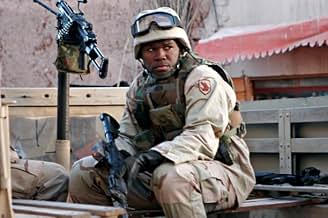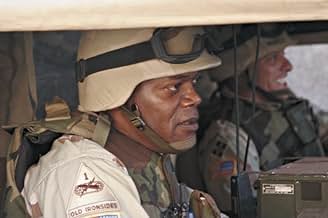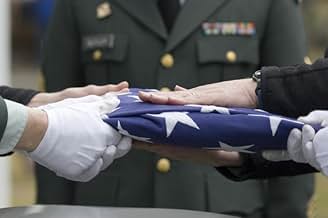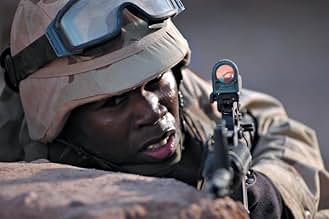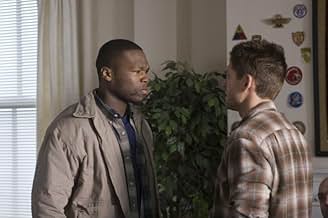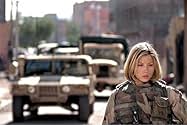Three soldiers struggle to readjust to life at home after returning home from a lengthy tour in Iraq.Three soldiers struggle to readjust to life at home after returning home from a lengthy tour in Iraq.Three soldiers struggle to readjust to life at home after returning home from a lengthy tour in Iraq.
- Awards
- 4 nominations total
50 Cent
- Jamal Aiken
- (as Curtis Jackson)
Jeffrey Nordling
- Cary
- (as Jeff Nordling)
Featured reviews
Irwin Winkler's "Home of the Brave" is much more than "just a movie," even if, as such, it's a partially flawed one. It is, without question, an important, thought- and emotion-provoking film, certain to be controversial.
Regardless of its merits, "Home" is brave, worthwhile, even admirable in its pioneering coverage of 150,000 soldiers "over there," and roughly the same number of returnees, who are trying to return in fact, not only in name.
This story of a group of National Guard soldiers from Spokane serving in Iraq and returning home is a schizophrenic experience: you are watching scenes straight out of last night's TV news, and yet feel as if you were back in the 1940s, in the era of "The Best Years of Our Lives" war movies, and the 1970s "Born on the Fourth of July" type Vietnam veteran sagas.
Given the subject, it's to Winkler's credit that "Home of the Brave" (a confusing title choice, considering the many movies with that name) remains firmly neutral about the current debate central to all politics. The film portrays both the support for and the opposition to the war, but favors neither. Winkler (producer for 40 years, including "Rocky" II-VI) sticks with characters in the context of the war, not making mouthpieces of them for or against a cause.
Mouthpieces, no; cardboard figures, some. Writing (by Mark Friedman) and acting are fair-to-problematic. The overemotional writing and excessively melodramatic acting combine to present a drama of extremes, denying the existence of true majority response to trauma: simple coping. Murder, suicide, insanity do occur in postwar situations, but most people, in my own experience, deal with such problems - more or less successfully - and go on with their lives.
In "Home of the Brave," you find no such "middle of the road," only extremes. After suspenseful (and depressing) Iraqi war scenes, shot in Morocco by Tony Pierce-Roberts, in a remarkably focused way that allows rare visual clarity in the midst of combat confusion, the film shifts to Spokane.
There, we follow - among many others - the lives of a combat surgeon (Samuel L. Jackson), a driver who loses an arm (Jessica Biel), three high-school buddies with intertwining stories (Chad Michael Murray, Brian Presley, and rap star 50 Cent). There are some quiet moments and reality-based situations, but the constant high-voltage !DRAMA! reveals and partially invalidates a manipulative hand pulling the (heart) strings.
Regardless of its merits, "Home" is brave, worthwhile, even admirable in its pioneering coverage of 150,000 soldiers "over there," and roughly the same number of returnees, who are trying to return in fact, not only in name.
This story of a group of National Guard soldiers from Spokane serving in Iraq and returning home is a schizophrenic experience: you are watching scenes straight out of last night's TV news, and yet feel as if you were back in the 1940s, in the era of "The Best Years of Our Lives" war movies, and the 1970s "Born on the Fourth of July" type Vietnam veteran sagas.
Given the subject, it's to Winkler's credit that "Home of the Brave" (a confusing title choice, considering the many movies with that name) remains firmly neutral about the current debate central to all politics. The film portrays both the support for and the opposition to the war, but favors neither. Winkler (producer for 40 years, including "Rocky" II-VI) sticks with characters in the context of the war, not making mouthpieces of them for or against a cause.
Mouthpieces, no; cardboard figures, some. Writing (by Mark Friedman) and acting are fair-to-problematic. The overemotional writing and excessively melodramatic acting combine to present a drama of extremes, denying the existence of true majority response to trauma: simple coping. Murder, suicide, insanity do occur in postwar situations, but most people, in my own experience, deal with such problems - more or less successfully - and go on with their lives.
In "Home of the Brave," you find no such "middle of the road," only extremes. After suspenseful (and depressing) Iraqi war scenes, shot in Morocco by Tony Pierce-Roberts, in a remarkably focused way that allows rare visual clarity in the midst of combat confusion, the film shifts to Spokane.
There, we follow - among many others - the lives of a combat surgeon (Samuel L. Jackson), a driver who loses an arm (Jessica Biel), three high-school buddies with intertwining stories (Chad Michael Murray, Brian Presley, and rap star 50 Cent). There are some quiet moments and reality-based situations, but the constant high-voltage !DRAMA! reveals and partially invalidates a manipulative hand pulling the (heart) strings.
This film is about how soldiers who served in Iraq face life back in their hometown.
The striking thing is that this film focuses on the emotional impact on the returning soldiers, and the people around them. The dialogs are raw, truthful and at times politically provocative. The portrayal of post traumatic stress disorder is subtle but palpable, and Jessica Biel's performance of a tough woman to hide her pains of losing her hand is astonishingly well acted.
I do not see this as an anti-war vehicle. Rather, it serves as a reminder of how wars affect the soldiers, and then make us think hard whether such a war was necessary in the first place. I am the most impressed by the filmmakers decision on making this movie, as the predominant climate in America is against them.
The striking thing is that this film focuses on the emotional impact on the returning soldiers, and the people around them. The dialogs are raw, truthful and at times politically provocative. The portrayal of post traumatic stress disorder is subtle but palpable, and Jessica Biel's performance of a tough woman to hide her pains of losing her hand is astonishingly well acted.
I do not see this as an anti-war vehicle. Rather, it serves as a reminder of how wars affect the soldiers, and then make us think hard whether such a war was necessary in the first place. I am the most impressed by the filmmakers decision on making this movie, as the predominant climate in America is against them.
After getting notice that they're soon going home, an American unit gets ambushed in Iraq. Will Marsh (Samuel L. Jackson) leads the drivers. Single mom Vanessa Price (Jessica Biel) survives a blast but loses her hand. Tommy Yates (Brian Presley) holds his dying best friend Owens in his arms. Jamal Aiken (50 Cent) gets hurts tripping over some bricks. They return to Spokane. Surgeon Marsh is dealing PTSD and his anti-war son Billy. Yates loses his job. Price deals with her hand and angry Aiken is haunted by killing a civilian.
The opening action scenes contain both the good and the bad of this movie. It does some compelling action. It's got good intensity. Then this ends in one of the most old-fashion melodramatic overwrought-music cry-holding-dying-buddy scene possible. That is the pull-push of this movie. It is sincere in its portrayal of the home front but it is also very on-the-nose. It's got good intentions. Everybody is acting well. It does need to pull back the melodrama.
The opening action scenes contain both the good and the bad of this movie. It does some compelling action. It's got good intensity. Then this ends in one of the most old-fashion melodramatic overwrought-music cry-holding-dying-buddy scene possible. That is the pull-push of this movie. It is sincere in its portrayal of the home front but it is also very on-the-nose. It's got good intentions. Everybody is acting well. It does need to pull back the melodrama.
Sincerity oozes from every scene of The Home of the Brave, but it can't disguise a rather routine story that has been told many times before. Essentially an updating of The Best Years of Our Lives, the film follows the trials of three veterans of the Iraqi occupation as they struggle to adjust to life back in civvy street. Jennifer Beils returns home minus her hand, Brian Presley is haunted by witnessing the death of his childhood friend while on duty, and surgeon Samuel L. Jackson is guilt-stricken by the lack of emotion he felt when he failed to save the wounded soldiers on his operating table. Like Harold Russell, Biels struggles to come to terms with the loss of her hand (although the hook has been replaced by a chunky looking prosthetic), which costs her a relationship, and like Dana Andrews, Brian Presley returns home to find his job has been given to someone else and finds employment in a low-paid job (ticket clerk at a multiplex instead of Andrews' soda jerk). In easily the least convincing storyline, Jackson seeks refuge from his feelings in alcohol.
The film's script can best be described as prosaic, with a couple of high-points standing out from the alarming reliance on familiar phrases and sentiments. The scene in the vice-principal's office is well played, and there are a couple of insightful moments, but everything looks too familiar, as if the film has been cobbled together as a kind of homage to the best of previous 'coming home' movies.
While no one questions the bravery and dedication of the troops from all countries in places like Afghanistan and Iraq – and there is no suggestion that this film is anything other than a genuine attempt by the makers to depict how it feels to find yourself a stranger in your own land with emotions you can't control or understand – you can't really hope to create a successful film if you're not prepared to allow it to embrace the bigger picture. I wonder how many people return from these places feeling betrayed by their leaders, and that they've been used by their country for reasons other than altruistic. The idea that the war in Iraq is about America's need for oil, and the questions arising from the States' heavy involvement on the world stage and the perception such an involvement gives rise to amongst its own population and people around the world, is only briefly alluded to – and even then by a troubled juvenile who is ostensibly rebelling against his parents.
The film's script can best be described as prosaic, with a couple of high-points standing out from the alarming reliance on familiar phrases and sentiments. The scene in the vice-principal's office is well played, and there are a couple of insightful moments, but everything looks too familiar, as if the film has been cobbled together as a kind of homage to the best of previous 'coming home' movies.
While no one questions the bravery and dedication of the troops from all countries in places like Afghanistan and Iraq – and there is no suggestion that this film is anything other than a genuine attempt by the makers to depict how it feels to find yourself a stranger in your own land with emotions you can't control or understand – you can't really hope to create a successful film if you're not prepared to allow it to embrace the bigger picture. I wonder how many people return from these places feeling betrayed by their leaders, and that they've been used by their country for reasons other than altruistic. The idea that the war in Iraq is about America's need for oil, and the questions arising from the States' heavy involvement on the world stage and the perception such an involvement gives rise to amongst its own population and people around the world, is only briefly alluded to – and even then by a troubled juvenile who is ostensibly rebelling against his parents.
The War Inside, November 6, 2007 By Grady Harp (Los Angeles, CA United States) - See all my reviews (TOP 10 REVIEWER) (REAL NAME) HOME OF THE BRAVE is one of those films that is difficult to critique: the message of how war permanently alters the minds and bodies of soldiers and their families is a meaningful one and one about which we need to be reminded. Irwin Winkler has made some good films (DeLovely, Life as a House, Guilty by Suspicion), but in this film he seems to be working against the script by Mark Friedman which has a tendency to oversimplify emotions and thus loses its impact.
The film begins in Iraq where each of the main characters is at least tangentially connected. Dr. Will Marsh (Samuel L. Jackson) is in a truck driven by Vanessa (Jessica Biel) and accompanied by soldiers Tommy (Brian Presley) and Jamal (50 Cent AKA Curtis Jackson) when a roadside bomb explodes, maiming the hand of Vanessa, killing Tommy's best friend, making Jamal witness unnecessary civilian deaths, and placing Will in an impotent position as a doctor. Flash forward to Spokane, Washington where each of these four wounded people try to piece their lives together in a world that loathes the Iraq war (not at all unlike the treatment of soldiers returning from the unpopular Vietnam debacle), trying to make sense of it all.
The problem with the good idea for a movie lies in the too traditional plot lines. The actors (especially Presley and Biel) give it their all, but credibility enters and the smoke rises and we are left with a misplaced patriotism. The message is strong: the delivery of it is shaky. Grady Harp
The film begins in Iraq where each of the main characters is at least tangentially connected. Dr. Will Marsh (Samuel L. Jackson) is in a truck driven by Vanessa (Jessica Biel) and accompanied by soldiers Tommy (Brian Presley) and Jamal (50 Cent AKA Curtis Jackson) when a roadside bomb explodes, maiming the hand of Vanessa, killing Tommy's best friend, making Jamal witness unnecessary civilian deaths, and placing Will in an impotent position as a doctor. Flash forward to Spokane, Washington where each of these four wounded people try to piece their lives together in a world that loathes the Iraq war (not at all unlike the treatment of soldiers returning from the unpopular Vietnam debacle), trying to make sense of it all.
The problem with the good idea for a movie lies in the too traditional plot lines. The actors (especially Presley and Biel) give it their all, but credibility enters and the smoke rises and we are left with a misplaced patriotism. The message is strong: the delivery of it is shaky. Grady Harp
Did you know
- TriviaSamuel L. Jackson and Christina Ricci appeared in Black Snake Moan (2006).
- GoofsWhen one soldier is told to fire the AT-4 at a gunman on the roof, he is holding it backwards when he is firing it. The rocket comes out of the smaller end of the tube, not the larger.
- Quotes
Will Marsh: Buck Fush? Buck you, you son of a bitch.
- SoundtracksTry Not to Remember
Written and Performed by Sheryl Crow
Produced by Stephen Endelman
Warner-Tamerlane Publishing Corp. (BMI)/Old Crow Music (BMI)
(All rights adnimistered by Warner-Tamerlane Publishing Corp.)
Courtesy of A&M Records
- How long is Home of the Brave?Powered by Alexa
Details
- Release date
- Countries of origin
- Official sites
- Languages
- Also known as
- Home of the Brave
- Filming locations
- Production companies
- See more company credits at IMDbPro
Box office
- Budget
- $12,000,000 (estimated)
- Gross US & Canada
- $51,708
- Opening weekend US & Canada
- $6,000
- Dec 17, 2006
- Gross worldwide
- $499,620
- Runtime1 hour 46 minutes
- Color
- Sound mix
- Aspect ratio
- 2.35 : 1
Contribute to this page
Suggest an edit or add missing content



